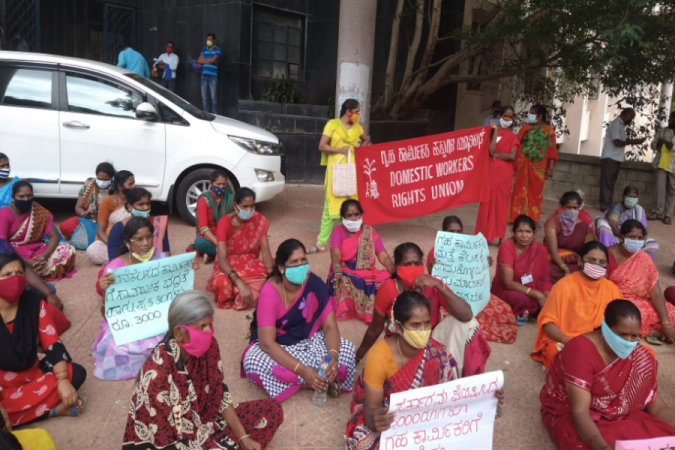Even as the lockdown lifts and Bengaluru attempts at restoring normalcy, domestic workers in the city organised a sit-in protest on Monday. The protest was organised against the loss of jobs and pay experienced by the majority of the workers during the lockdown. The Domestic Workers' Rights Union's (DWRU), Bruhat Bangalore Gruhakarmika Sangha (BBGS) and Manegelasa Kaarmikara Union's recent survey reported that 91 per cent of domestic workers had not been paid under lockdown.
The peaceful sit-in protest, saw a group of women meet the labour department yesterday morning and handed in their demands and the survey report. The survey also looks into the Resident Welfare Associations' (RWAs) stand on domestic workers in the city.

Lack of jobs and pay loss in Bengaluru
Domestic workers from around Bengaluru gathered at Karmika Bhavana on Monday for a sit-in protest demanding better working rights from the government. The Domestic Workers Rights Union, BBGS and Manegelasa Kaarmikara Union conducted a survey in the first two weeks of May. The survey included 2,500 domestic workers.
The findings in the survey report, 'The COVID-19 Pandemic and the Invisible Workers of the Household Economy' stated that 91% of the workers in the month of April lost salaries and 50% of all the workers aged above 50 lost their jobs entirely during the lockdown. The report further stated that 2084 (approx. 87%) of the workers surveyed were told not to come into work in March and were unsure whether they would still have their jobs. The report will be published tomorrow on the International Domestic Workers' Day.
Domestic Workers Rights Union on protest at labour dept, Bluru today. Govt has not announced any compensation, many people still not taking workers back to work. How are they to manage @CMofKarnataka
— ನಾವು ಭಾರತೀಯರು Naavu Bharathiyaru (@peopleofindiaka) June 15, 2020
These are workers whom your dept should care for @ShivaramHebbar pic.twitter.com/snP2lhMQSr
The workers also protested the Resident Welfare Association (RWA)'s demeaning directives issued during the lockdown period against domestic workers around the city. Some of the instances include not letting domestic workers use the lift, or be in common areas between shifts and asking for personal information without any proper protocol or security of information.
The worker's demands include being registered with the government to come under the social security net and avail government safety and security programmes. The demands for the RWAs include not promoting discriminatory practices like not taking the lift, having a supply of masks, gloves and sanitizer in place, limiting data collection while ensuring data security and paying full salaries to domestic workers amid lockdown. Many workers are in deep trouble and have been hit severely by the ongoing crisis.














